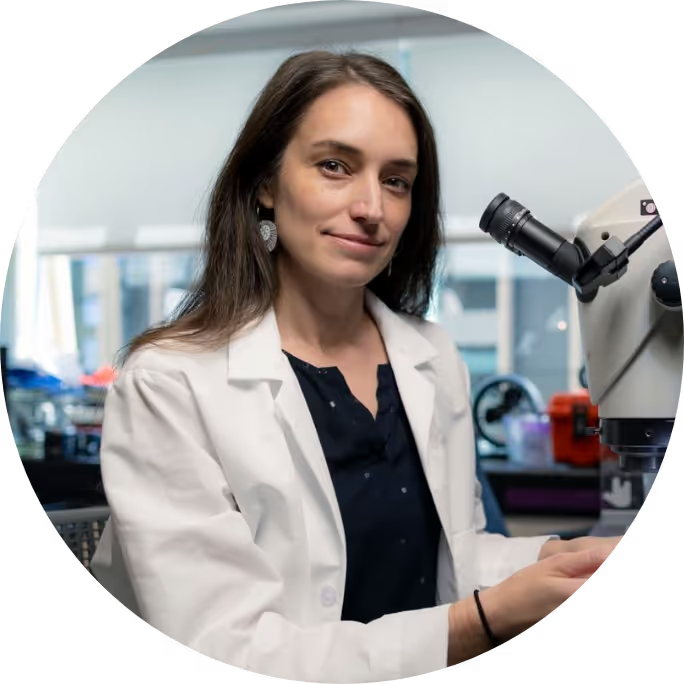Lauren A. O'Connell

Associate Professor of Biology
Wu Tsai Institute for Neuroscience
Sarafan Chem-H
Principal Investigator at Stanford University
Lauren O’Connell is a neuroscientist, evolutionary biologist, and Associate Professor in the Department of Biology at Stanford University. She specializes in exploring the intersections of behavioral neuroscience, physiology, and ecology. Her research investigates how animals evolve new behaviors and physiological traits. In neuroscience, she focuses on the evolution of parent-offspring interactions to better understand how parental investment shapes offspring well-being. Her physiology research examines how poisonous animals protect their nervous systems from environmental toxins, with the aim of developing antidotes for compounds with high overdose risk.
Dr. O’Connell began her academic journey at Tarrant County College, earning an Associate of Arts in Natural Sciences in 2004. She then transferred to Cornell University, where she developed an interest in the mechanistic basis of animal behavior. After completing her undergraduate studies, she pursued a Ph.D. in Cellular and Molecular Biology at the University of Texas at Austin, studying social networks in cichlid fish and investigating the evolution of brain regions supporting social behavior in vertebrates. Following her Ph.D., O’Connell became a Bauer Fellow at Harvard University, where she established her independent research lab. In 2017, she joined Stanford University’s Department of Biology, progressing from Assistant Professor to Associate Professor.
Lauren O’Connell’s research has earned numerous accolades, including the Presidential Early Career Award for Scientists and Engineers from President Biden, the L’Oréal USA For Women in Science Fellowship, an NIH New Innovator Award, and the Frank A. Beach Early Career Award. Her work and perspectives have been highlighted in prominent outlets such as The Wall Street Journal, National Geographic, and The New York Times, among others.
Dr. O’Connell’s upbringing on a goat farm in rural Texas deeply influenced her passion for organismal biology and her commitment to science outreach. Growing up in this environment instilled in her a drive to make science accessible to underserved communities. She is dedicated to engaging with rural, low-income, and public school students, aiming to inspire the next generation of scientists by bringing research and discovery into classrooms that might otherwise lack access to such opportunities.
Positions and Education
Honors and Awards
Teaching Experience
BIO 161
:
Organismal Biology Lab
This laboratory is an authentic research experience course where students contribute to original research. In one module, students will perform experiments in the field of chemical ecology by screening for novel natural compounds that influence animal behavior. This will involve on-campus fieldwork and laboratory experiments. In a second module, students will conduct animal behavior experiments that examine sensory systems in a laboratory setting. Students will work collaboratively to collect and analyze data and learn to communicate their findings through a journal-style scientific article.
BIO 84
:
Physiology
The focus of Physiology is on understanding how organisms tackle the physical challenges of life on Earth. This course will provide an overview of animal and plant physiology and teach an understanding of how organisms maintain homeostasis, respond to environmental cues, and coordinate behaviors across multiple tissues and organ systems. We will examine the structure and function of organs and organ systems and how those systems are controlled and regulated to maintain homeostasis. Control and regulation require information, as does the ability to respond to environmental stimuli, so that we will give special consideration to hormonal and neural information systems. We will also be concerned with the interactions and integration of the activities of the different organ systems we study.
BIO 159
:
Herpetology
This course introduces students to herpetology, or the study of reptiles and amphibians. Students will learn foundational concepts in reptile and amphibian evolution, physiology, behavior, and ecology through hands-on experiences. This course includes two field-based modules: one centering on local salamander populations and the other a general survey of the amphibian and reptile biodiversity on campus. Additionally, a student-driven and designed laboratory experiment will allow students to apply and connect course concepts about behavior and physiology. Students will learn to analyze, visualize, and present data from field and laboratory experiments. Student involvement in local monitoring efforts will contribute to the ongoing conservation of amphibians and reptiles on campus.
BIO 85
:
Evolution
Understanding evolution is key to understanding the diversity of life on Earth. We will focus on the fundamental principles of evolutionary biology, from natural and sexual selection to the formation of new species. To understand these concepts, we will delve into the mechanisms that underlie them. The course will also link these fundamental processes to important contemporary evolutionary topics such as the evolution of behavior, life history evolution, and human evolution.
Mentorship
My mentoring philosophy focuses on fostering individual growth, professional development, and community success. I aim to support my mentees by leveraging their strengths and providing the tools they need to achieve their career goals. This involves honest communication, constructive feedback, and clear expectations within a supportive, inclusive environment. My goal is for every trainee to feel valued, supported, and prepared for their chosen path.
To become equipped for this goal, I have completed over 60 hours of Mentorship Skill Development that includes the following modules:
- The Science of Effective Mentorship
- Optimizing the Practice of Mentoring
- Leveling the Playing Field by Articulating Expectations
- Improving Communication with your Mentee
- Sharing Mentorship Challenges and Solutions
- Culturally Aware Mentoring
- Cultural Self-Awareness
- Promoting Research Self-Efficacy
- Raising Issues of Culture in the Research Mentoring Relationship
- Putting Culturally Aware Principles into Practice
Professional Service
Invited Talks (Selected)
Invited Conference Talks (*Plenary/Keynote)
Invited Seminars and Lectureships (*invitation by graduate students or postdocs)
Memberships
Animal Behavior Society
International Society for Neuroethology
Society for Neuroscience
Society for the Study of Evolution





